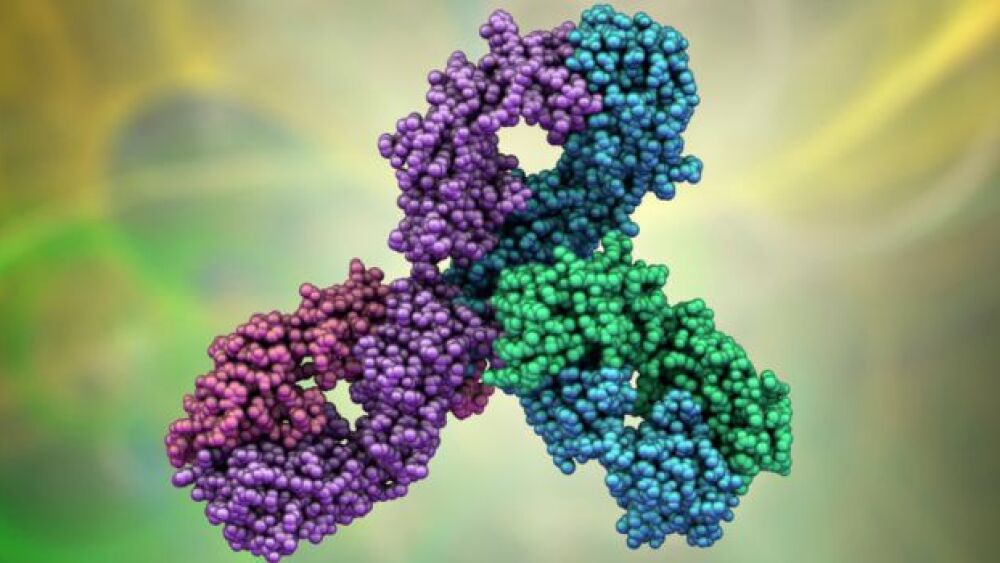The Inflation Reduction Act could put an end to blockbuster runs like that of Merck’s Keytruda, experts told BioSpace. In the meantime, the drug keeps picking up more indications and positive clinical results.
Pictured: A Molecular model of Pembrolizumab/iStock, Dr_Microbe
First approved by the FDA in 2014, Keytruda is the undisputed cornerstone of Merck’s oncology portfolio. With 35 approvals across 16 types of cancer and two tumor-agnostic indications, the PD-1 inhibitor is projected to become the world’s top-selling drug by 2025.
But it might be the last of its kind in the oncology space, Jayson Slotnik, partner at Health Policy Strategies, told BioSpace in June, due to the effects of the Inflation Reduction Act (IRA).
Passed by President Joe Biden in August 2022, the IRA gives the Secretary of Health & Human Services (HHS) the power to negotiate lower prices on some top-selling drugs on behalf of Medicare.
Under the IRA, small molecule drugs—such as Keytruda (pembrolizumab)—come up for negotiation nine years after the first FDA approval, while biologics enjoy 13 years of exclusivity.
“Merck would never spend the time and the money to continue to invest in other indications for a Keytruda because . . . [the Centers for Medicare & Medicaid Services] is negotiating the drug from the first day of FDA approval,” Slotnik said.
In a lawsuit filed against the Biden administration in June challenging the part of the IRA pertaining to drug negotiation, Merck stated it expects Keytruda to ultimately be subject to these negotiations. In the meantime, the blockbuster has been on quite a run in 2023, racking up approvals in adjuvant non-small cell lung cancer (NSCLC) and bladder cancer and posting positive clinical data in more indications.
Here’s a look at some of Keytruda’s most recent approvals and clinical results.
Adjuvant NSCLC
Merck didn’t have to wait long to announce its first Keytruda approval of 2023, as the FDA gave the drug its blessing in adjuvant NSCLC on Jan. 27l. Keytruda was specifically approved to treat patients with stage IB, II or IIIA NSCLC after resection or platinum-based chemotherapy. The approval was Keytruda’s fifth in NSCLC, giving Merck a significant slice of this market. Keytruda is also the only immunotherapy approved for both metastatic and adjuvant NSCLC, regardless of PD-L1 expression status. The most recent approval followed data from the Phase III KEYNOTE-091 trial, in which adjuvant treatment with Keytruda reduced the risk of disease recurrence or death by 27% compared to placebo.
First-Line Urothelial Carcinoma
In April, the FDA greenlit Keytruda—in combination with Seagen and Astellas’s Padcev (enfortumab vedotin-ejfv)—for the first-line treatment of locally advanced or metastatic urothelial carcinoma. The Keytruda/Padcev combo is the first therapeutic regimen in the U.S. that combines a PD-1 blocker (Keytruda) and an antibody-drug conjugate (Padcev) in this indication, according to Merck. The duo elicited a 68% objective response rate in the Phase Ib/II KEYNOTE-869 study, along with complete and partial response rates of 12% and 55%, respectively.
Biliary Tract Cancer
At the American Association for Cancer Research (AACR) 2023 Annual Meeting in April, Merck presented Phase III data showing that Keytruda significantly improved overall survival (OS) compared to chemotherapy alone in patients with biliary tract cancer (BTC). A rare type of cancer that develops in the bile ducts and gallbladder, BTC is often diagnosed at the advanced stages, making it particularly deadly. In the randomized trial, 1,069 patients with metastatic or unresectable BTC were assigned to receive either gemcitabine and cisplatin alone or in combination with Keytruda. After being followed for a median 25.6 months, patients taking Keytruda had a 17% lower risk of death than those who received chemotherapy alone and a mean overall survival advantage of 1.8 months. The FDA accepted Merck’s supplemental Biologics License Application on June 8 and set a PDUFA date of Feb.7, 2024.
Desmoplastic Melanoma
Also at AACR, Keytruda improved clinical responses in desmoplastic melanoma—a rare type of skin cancer that accounts for less than 4% of primary cutaneous melanomas, according to the National Institutes of Health. Of 27 patients with unresectable metastatic desmoplastic melanoma given Keytruda every three weeks for two years, 89% demonstrated a clinical response, with 33% seeing a complete response. As for safety, 25% of participants had a serious adverse event. Merck plans to evaluate the drug’s long-term efficacy, including overall survival and progression-free survival. Keytruda is already FDA-approved for the first-line treatment of patients with unresectable metastatic melanoma, and continued efficacy data could ultimately secure Merck another piece of this market.
Keytruda/Vaccine Combo in High-Risk Melanoma
Merck and Moderna’s therapeutic cancer vaccine gambit is beginning to bear clinical fruit. The companies presented data at AACR from a Phase II trial of the vaccine, mRNA-4157/V940, in combination with Keytruda in high-risk melanoma following complete resection, showing a 44% reduction in the risk of recurrence or death compared with Keytruda alone. It was the first randomized, controlled trial to show benefit from this type of cancer vaccine, Jeffrey Weber, deputy director of NYU Langone’s Perlmutter Cancer Center and the study’s senior investigator, told NBC News at the time. The partners plan to initiate a Phase III study in patients with adjuvant melanoma at some point in 2023.
Perioperative NSCLC
This Fall, Merck will learn the fate of its sNDA for Keytruda in perioperative stage II, IIIA or IIIB NSCLC. In June at the 2023 American Society of Clinical Oncology annual meeting, the company presented highly anticipated data that could bolster its case. In a Phase III trial, Keytruda plus chemotherapy significantly improved event-free survival (EFS) and reduced the risk of disease recurrence, progression or death by 42% in this setting. This set Keytruda apart from its rival, AstraZeneca’s Imfinzi (durvalumab), which showed a 32% EFS rate in the same setting. The FDA is expected to make a decision on or before Oct. 16.
Heather McKenzie is a senior editor at BioSpace, focusing on neuroscience, oncology and gene therapy. You can reach her at heather.mckenzie@biospace.com. Follow her on LinkedIn and Twitter @chicat08.






